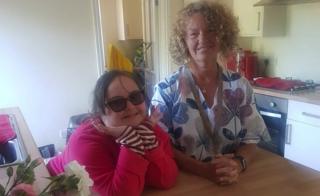 Image copyright Caroline Sinfield
Image copyright Caroline Sinfield Throughout the various lockdowns around the world, extraordinary examples have emerged of people helping those most in need. This is the story of one of those – carer Caroline Sinfield.
Before lockdown, life for Shannon was busy, between volunteering at her local charity shop, keeping up with her arts and crafts hobbies and catching up with family.
But in just a few months, much of that changed.
In July last year, Shannon, who has Down’s Syndrome, lost her mother to cancer. The two were very close, and would meet up for coffee and shopping trips and would video-call each other two or three times a day.
Then in March, as the coronavirus pandemic began sweeping across Britain, Shannon broke her ankle.
This made it impossible for her to stay in her first-floor flat, where she had been living semi-independently, with regular visits by support staff, since she graduated from college in Yeovil two years ago.
Shannon, 24, had to start using a wheelchair to get around and had to move to an unfamiliar temporary home. On top of that, the government restrictions around the global pandemic, introduced on 23 March, meant her family and friends were unable to visit.
In just a few weeks, everything stable in Shannon’s life had shifted and it was too much to cope with, says Claire Lambert, a manager at the Aldingbourne Trust, whose staff support Shannon.
“She had to go into a temporary respite placement and when lockdown happened, she was very confused,” Claire says. “She didn’t understand why she couldn’t see people she knew.”
It was then that Shannon contracted Covid-19.
Although Shannon was not in the most high-risk category from Covid-19, NHS England has revealed, after pressure from campaign groups, that 515 people with a learning disability died with Covid-19 between 16 March and 22 May.
NHS England acknowledges this number is likely to be higher and is sharing data with Public Health England “to help us better understand the impact of Covid-19 on people with a learning disability”. It’s not clear when this analysis will be released.
As a naturally sociable person, Shannon found it difficult to distance herself from other people while unwell. Claire says Shannon became angry towards staff and conversations took place over whether a new secure placement might be the best option for her.
Shannon’s main carer Caroline Sinfield didn’t want this to happen. She had worked with Shannon for 18 months and was worried her behaviour might get worse if she was moved to another unfamiliar place with more people she didn’t know.
“Shannon understands everything that you say,” Caroline says, “but she isn’t able to explain to you how she is feeling so it’s reflected in her behaviour.”
Richard, Shannon’s father, was also very worried. “I was really against it, and the social worker was against it as well, but he was in a corner really, trying to comply with the [coronavirus] regulations and finding somewhere for Shannon to go where she’s safe and happy.”
No-one close to Shannon wanted her to move to a secure unit far away from her family. And so Caroline came up with a solution. She told her bosses that she would move in with Shannon while she recovered from coronavirus, if they could find them somewhere to stay.
The Aldingbourne Trust managed to find an empty holiday let for Shannon and Caroline, wrote up a tenancy agreement and furnished it so that Shannon could be looked after by someone she knew.
Shannon and Caroline have been living together now for more than two weeks, along with Mia, Caroline’s chihuahua-Jack Russell cross. I phone Shannon as she’s outside with Caroline in the garden and I ask her how she is. “Fine, I’m on holiday with Caroline and Mia and we are baking cakes,” she says.
Caroline doesn’t believe she’s done anything special for Shannon. “We’re in such a wonderful spot, in a wonderful house and a lovely garden and we’re just enjoying each other’s company and really enjoying the lovely weather.
“Shannon is much happier with people that she knows and trusts. It wasn’t a difficult decision, I volunteered, nobody expected me to do it and nobody asked me to do it, I just knew Shannon was in trouble and why wouldn’t I? I don’t have any family commitments, so I’m free as a bird.”
Shannon had a sore throat for about four or five days but her symptoms did not worsen. The Aldingbourne Trust provided Caroline with PPE to protect herself although she laughs “cooking dinner with a visor on isn’t exactly practical.”
Claire is in no doubt Caroline’s actions have made a huge difference to Shannon’s life.
“She’s sitting up and eating pizza. It’s amazing considering how she was coping in the previous environment where she didn’t know anybody and it was all very unfamiliar.
“It makes me very very proud to work for an organisation that has gone to huge lengths to get such a good outcome for somebody who possibly would have ended up in a service which would have made her so much worse.
“She may have got stuck in a mental health service where that very environment would have exacerbated her challenging behaviours and it would have been a circle where she would have got stuck there.”
According to the Challenging Behaviour Foundation, the average total length of stay in inpatient units is 5.7 years. The foundation says people in these units can be “subject to restrictive interventions (like physical, prone, mechanical and chemical restraint).”
Last week Shannon was able to see her father Richard for tea in the garden for the first time in two months. “You’re a good boy,” Shannon told her father as he laughed in the sunshine.
“She’s got through it all and she’s really happy with Caroline,” Richard says.
Shannon plans to return home in the coming days before moving into a new flat. Her new neighbour will move in at the same time: Caroline.
“I don’t mind moving, this whole thing has been so fortuitous,” Caroline says. “I’m actually living with a friend at the moment anyway.
“I’ll remember these two weeks for the rest of my life, all we’ve done is just laugh and laugh.”
Shannon sums it up best when I ask her how it’s been living with her carer: “I know I love Caroline.”
Source: BBC News – Health








